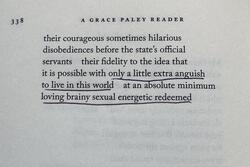Blaming the Feminist Revolution for women’s supposed ‘unhappiness’
The results of a General Social Survey, which has been tracking American’s happiness since 1972, have surprised and confused us with their finding that women are growing increasingly unhappy over time. Maureen Dowd’s “Blue is the New Black” editorial in the New York Times has framed these findings in a way that suggests the Feminist Revolution has failed women; that the variety of choices available to women today are responsible for our supposed “unhappiness.” Both the survey and the editorial raise a lot of questions, many of which can only be answered with speculation.
Before we all begin preemptive anti-depressant regimens, let’s remember that statistics like these must always be viewed with a critical eye. The first question that comes to mind is this: do women define happiness the same way today as they did in 1972? The answer to that question is no. I think Nora Ephron said it best in Crazy Salad (1975):
“We have lived through the era when happiness was a warm puppy, and the era when happiness was a dry martini, and now we have come to the era when happiness is ‘knowing what your uterus looks like.’”
If ‘knowing what your uterus looks like’ defined happiness in 1975, what defines it today? (Actually, that’s a fun question! Leave your answer in the comments.) To get philosophical for a moment, is happiness ever really attainable? As Beverly Sills said in a 1975 60 Minutes interview, “A happy woman is one who has no cares at all; a cheerful woman is one who has cares but doesn’t let them get her down.” From that perspective, what is the point of trying to measure happiness in the first place?
The survey suggests that while women are increasingly unhappy as they age, men’s happiness actually increases as they get older. Do men and women define happiness differently? Or is there, perhaps, a “language of happiness” that differs for men and women? Could this explain the difference in "happiness reporting?" I do not have the answers to these questions but I do know that a survey that purports to quantify “happiness” is one that must be taken with a grain of salt.
The survey and Dowd’s editorial have got people thinking about the stress of juggling work and home. But is this balancing act really responsible for our alleged “unhappiness?” Were women happier with fewer choices? Debra Nussbaum Cohen hit the nail on the head when she wrote, “It seems, in this study and in Dowd’s column, as if happiness is being confused with ease.” The balance of work and home is not easy and while we are seeing some improvement, the primary housekeeping and care-giving responsibilities are still borne by women. Cohen asks: are women unhappy, or just stressed?
The good news is that this kind of discussion reminds us of the work left to be done in the struggle to achieve true equality. Case in point: the language Dowd uses to describe certain “female” traits.
“Add to this the fact that women are hormonally more complicated and biologically more vulnerable. Women are much harder on themselves than men.
They tend to attach to other people more strongly, beat themselves up more when they lose attachments, take things more personally at work and pop far more anti-depressants.”
These assertions make me question Dowd’s level of understanding when it comes to gender and feminism. How exactly are women “biologically more vulnerable?” Vulnerable to what? I would also like to compare Dowd’s claim that women “take things more personally at work” to a vintage “Guide to Hiring Women” from 1943, which states: “Women are often sensitive; they can't shrug off harsh words the way men do. Never ridicule a woman - it breaks her spirit and cuts off her efficiency.” Finally, the reason women “pop” more anti-depressants could have something to do with the fact that these drugs are marketed primarily to women. Dowd’s statements are hardly “facts,” and she should know better than to casually refer to them as undisputed truths in an editorial about feminism.
But let’s use common sense here. Even if this “unhappiness” is the result of the choices opened up to women by the Feminist Revolution, do we go back to the way things were? Of course not. Suggesting that the Feminist Revolution is to blame goes on the false assumption that the Feminist Revolution is over. If there is anything to take away from this survey, it is the fact that gender equality has NOT been achieved. Feminism is an ongoing, evolving process, and there is work to be done.







hi again. this is my second post here.
yes, all points above i think are good ones. and i second the motion about doing.
i was thinking about this again this morning while walking my dog. and this popped into my head:
Happiness shouldnt be a Noun, Happy shouldnt be an adjective, Happy should be a Verb!
happy is as happy does. it's through doing that we contribute. especially if we're busy doing something that we value. it's through doing that we feel connected to others and like we make a difference... and that leads to happiness.
Like Victor Frankl says: we search for meaning and connection, and it can take any shape or form, and then we're happy.
maybe it's more complicated now if we now have more choices, but i think the tradeoff is worth it: we dont have to squeeze into any little role or box to find a meaningful path. we are so free to explore, free to be our true selves, and for that i am so grateful!!!
Jewish tradition teaches us that being happy means being satisfied with one's lot. I think we would never make progress if we are "satisfied" with what we have...but happiness is too ephemeral to define. IMHO, it is best to enjoy life while one can and do for others. That brings satisfaction to the do-er, and happiness to one who receives the benefit of the doing.
Wow, very nice posts. I am a 29 year old female who has always been strong willed. Earlier on, I was set in the idea that I was going to do this or that in the world. I had also read a blog from Jan 09, asking if intelligent people tend to be more unhappy. Some of the ideas put forth come from childhood and how intelligent people (geeks) were isolated, therefore being isolated in their problem solving in life. I do think that by having more choices, it has added complexity, adding more thinking, thus possibly not living in the moment. Very good video presentation on how having more choices to all has set us back. Check it out:
http://www.ted.com/talks/barry_schwartz_on_the_paradox_of_choice.html
With us, as females...we are different (ruled by the moon). We do have different needs than men. For me, I thought I could do anything. I thought that my hardwork and ideas would get me equal pay. As I "feel" and see "inequality", I begin thinking and it makes me unhappy. If the playing grounds were truly equal as men then it may not be so hard. We wouldnt have to think about how we are not being valued the same as a male. The freedom to have choices still gives us limited outputs. We don't gain the same from the various choices as a man. And to the point of men not being able to deal with women of our kind...I totally agree. I tallied up my friends and family who are females and gauged their mindset and ways about life. It appears the ones who are not independantly minded as in intellect are the ones who have husbands & families. The ones, like myself who have worked their way up the ladder of life are single. The guys who come across them want them to be a cookie, but we are too smart to have our value set on that. Trying to have conversations with men on issues in the world are normally too much to think about. All they want is their beer and football. I am not saying this is everyone...every man is like this or every woman is like this. However, if I holistically view my own experience and perception, I think both your cases are very valid.
my def. of happiness is: to achieve a certain peace of mind. to drop my mishegoss as much as possible and float serenely thru joyful times and float as sturdily as i can thru the trying times. to be okay with where i am, who i am, and what i have. that's contentment.
now this is just an aside, and i may be wrong, but although feminism has been great for us girls, (i am almost 50 years old), here is my point of view about men in my age group. let me know your feedback on my opinion here; okay, here it is: i will say it straight out, then y'all can let me have it.
i am so disappointed. i feel that our feminist "revolution" altho it didnt happen so fast, but was gradual, really ended up leaving the guys of my generation unprepared.
i just dont see many who can really handle an independent woman. they dont know how to handle me, they need me to tone it down, they want something completely different than who i am. hmm. that"s just been my experience. my issue, most likely. but, a real open, loving, sharing, helping, partnering relationship seems... rare to me. from what i can see from my experience and those around me.
so, yeah, maybe men seem happier over the long run. according to the thing you wrote above. i dont think i have seen that around me, is what i,m saying. so many guys in my gen. are... lukewarm. into themselves. very much so. insecure. cant commit. whatever. they dont seem too happy with themselves.